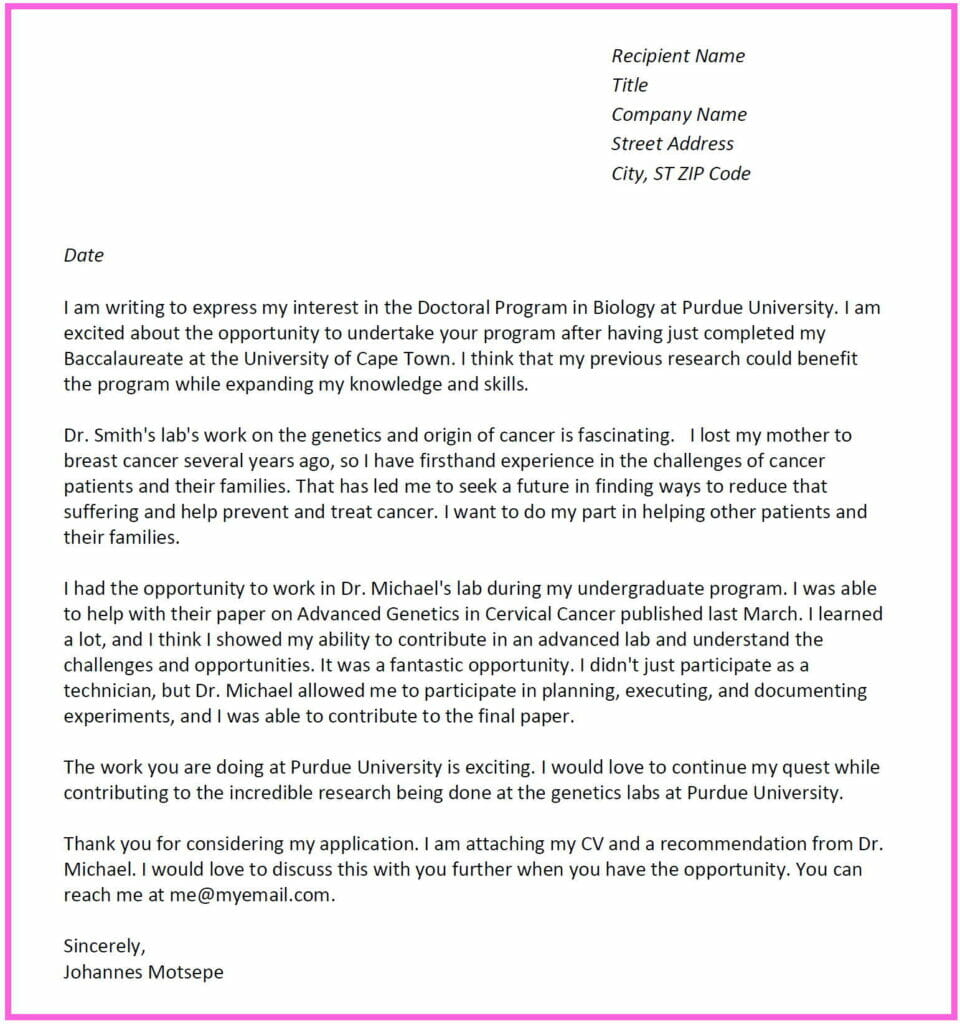- Terms And Conditions
- Privacy Policy
- Editorial Policy


Best Motivation Letter for Phd: 07 + Samples

When applying for a PhD program, one of the most important parts of your application will be your motivation letter. This is your chance to sell yourself to the admissions committee and convince them that you are the right candidate for the program. So how do you write a strong motivation letter?
One of the most important things to remember is to tailor your letter to the specific program you are applying to. Every school is looking for something different in their students, so you need to make sure that your letter highlights why you would be a good fit for that particular program. In addition, you need to demonstrate your passion for research and explain how your previous experiences have prepared you for a PhD program.
Finally, remember to proofread your letter carefully before submitting it. A well-written and error-free letter will make a strong impression on the admissions committee and could be the difference between being accepted into the program or not. So take your time and make sure that your motivation letter is the best it can be.
How To Write Motivation Letter for PhD
Many people believe that a successful PhD application must include a standout motivation letter. While it’s true that your CV and research proposal are important, the motivation letter is your chance to explain why you’re the best candidate for the program. In other words, it’s your chance to sell yourself! When writing a motivation letter for PhD, there are a few things you should keep in mind.
First, be clear about your goals and what you hope to achieve by pursuing a PhD. Second, make sure to demonstrate your passion for research and highlight your previous successes. Finally, be sure to proofread your letter carefully – mistakes can reflect poorly on your application. By following these tips, you can write a strong motivation letter that will help you get accepted into the PhD program of your choice.
Related: How To Write a Cover Letter (And Get Hired in 2022!)

Motivation Letter for PhD
Dear Sir or Madam,
So, I am writing to apply for a Ph.D. program in your esteemed university.
So, I have always been interested in research and academia, and a Ph.D. is the natural next step for me in my academic journey also, i am confident that I have the necessary skills and qualifications for a successful Ph.D. program, as well as the motivation and commitment to see it through.
Also, I am looking forward to contributing to your university’s research efforts, and I am confident that I can make significant contributions to the advancement of knowledge in my field of interest. So, I would be grateful for the opportunity to pursue a PhD at your institution, and I thank you in advance for your time and consideration.
Sincerely, Your name
Related: Creative Motivational Letter for Learnership [7 Samples]
PhD motivation letter sample
Dear hiring manager,
Also, I am writing to apply for the Ph.D. program at your university. I am immensely excited about this opportunity to pursue my passion for research and contribute to knowledge in my field.
Also, I have always been driven by a deep curiosity and a desire to understand the world around me. My undergraduate studies in psychology gave me a strong foundation in scientific methods and critical thinking. I was particularly drawn to research on human cognition and behavior. My honors thesis, which investigated how people process and remember information, confirmed my interest in pursuing a career in research.
During my Masters’s degree, I had the opportunity to work as a research assistant on a number of projects, including a large-scale study of memory and aging. This experience solidified my interest in research and confirmed my desire to pursue a Ph.D.
I am confident that I have the skills and abilities necessary to be successful in a Ph.D. program. In addition to my academic achievements, I have developed strong research and analytical skills through my work experience. So, I am also familiar with a variety of statistical software programs, which will be essential in completing my doctoral research.
So, I am committed to pursuing a career in research and am confident that I have the skills and abilities necessary to be successful in a Ph.D. program. I would be grateful for the opportunity to pursue my studies at your university and contribute to my knowledge in my field.
Thank you for your time and consideration.
Related: Great Psychology Motivation Letter : 9+ Samples
Motivation letter for Ph.D. application
Dear hiring committee,
I am writing to apply for the Ph.D. program in your department also i am very interested in pursuing a career in research and academia, and I believe that your program would be an excellent fit for me.
I have a strong academic record, having graduated with honors from my undergraduate and master’s programs and I have also published several research papers in peer-reviewed journals. My research interests include (name a few areas of interest), and I believe that I would be an excellent addition to your department.
I am eager to begin my Ph.D. studies, and I believe that your department would provide me with the necessary resources and support to succeed. I look forward to discussing my application further with you.
Sincerely, (Your name)
Related: Best Motivation Statement For UN Volunteer : 5+ Example
Motivation letter for PhD sample
Dear Scholarship Committee,
I am writing to apply for the PhD program in XXX at XXX University.Also, I am immensely interested in this program as it will allow me to explore my interests in XXX and develop my skills in research and academic writing.
So, I have always been passionate about XXX and have been fortunate enough to have had opportunities to pursue this interest through my studies and work experiences. My undergraduate research project in XXX was particularly instrumental in sparking my interest in pursuing a career in academia. Also, I am confident that I have the skills and motivation necessary to succeed in a PhD program and contribute to the field of XXX.
I would be grateful for your consideration of my application to the XXX PhD program. Thank you for your time and consideration.
Sincerely, XXX
Related: 7+ Sample Motivation Letter for Masters Degree
Motivation letter for PhD scholarship
I am writing to apply for the PhD scholarship in your department. Also, I am immensely interested in pursuing a career in research and academia, and I believe that this opportunity would be invaluable in helping me reach my long-term goals.
So, I have completed my undergraduate and masters degrees with excellent grades, and I have been actively involved in research throughout my studies. I am confident that I have the necessary skills and knowledge to be successful in a PhD program.
In addition, I am passionate about making a difference in the world through my research. My previous work has focused on issues such as climate change and sustainable development, and I believe that my research can contribute to finding solutions to these pressing global problems.
I am confident that I can be a valuable asset to your department. And I look forward to contributing to your research program. I thank you for your consideration, and I hope to hear from you soon.
Related: Best Motivational Letter For Graduate Program:7 Sample
5 Things To Include Motivation Letter for PhD
A motivation letter for PhD admission plays a significant role in determining whether you will be accepted into the program or not. The Although your transcripts and GRE scores provide valuable information about your academic accomplishments. The motivation letter gives you an opportunity to tell your story and demonstrate your passion for the field. When writing your motivation letter, be sure to include the following five elements:
- First, provide an overview of your academic background and research experience. This will give the admissions committee a sense of your qualifications for the PhD program.
- Next, describe your motivation for pursuing a PhD. What are you hoping to accomplish with your degree? What do you find most exciting about the field of study? Why do you want to attend this particular program?
- Third, explain your research interests. What specific topics are you interested in exploring during your studies? How do these interests align with the research programs of the faculty at this university?
- Fourth, identify your career goals. What do you hope to do after completing your PhD? How will this degree help you achieve those goals?
- Finally, provide a summary of why you believe you would be an excellent candidate for the PhD program. What are some of your unique strengths and experiences that would make you an asset to the university?
By including these five elements in your motivation letter, you will give yourself the best chance of being accepted into the PhD program of your choice.
Related: What is Cover Letter? Complete Guide To Get any Job.
I hope you found this blog helpful as you write your own motivation letter. The most important thing to remember is to be genuine and passionate about your research – admissions officers can tell when a student is simply trying to check off the boxes on a form. So, take your time, be honest with yourself, and let your excitement for learning shine through in your writing. Best of luck as you pursue your academic dreams!

You may also like
The benefits of a motivational letter: examples and....

Motivation Letter For PHD In Electrical Engineering:...

Motivation Letter For PHD In Environmental Sciences:...

Motivational Letter For PHD In Civil Engineering : 7+...

Motivational Letter For PHD In Mechanical Engineering...

Motivation Letter For PHD In Anthropology: 7+ [Free...
About the author.
Jessica William
Leave a comment x.
Save my name, email, and website in this browser for the next time I comment.

How to Write a PhD Motivation Letter
- Applying to a PhD
A PhD motivation letter is a document that describes your personal motivation and competence for a particular research project. It is usually submitted together with your academic CV to provide admissions staff with more information about you as an individual, to help them decide whether or not you are the ideal candidate for a research project.
A motivation letter has many similarities to a cover letter and a personal statement, and institutions will not ask you to submit all of these. However, it is a unique document and you should treat it as such. In the context of supporting a PhD application, the difference is nuanced; all three documents outline your suitability for PhD study. However, compared to a cover letter and personal statement, a motivation letter places more emphasis on your motivation for wanting to pursue the particular PhD position you are applying for.
Academic cover letters are more common in UK universities, while motivation letters are more common abroad.
A motivation letter can play a key part in the application process . It allows the admission committee to review a group of PhD applicants with similar academic backgrounds and select the ideal candidate based on their motivations for applying.
For admission staff, academic qualifications alone are not enough to indicate whether a student will be successful in their doctorate. In this sense, a motivational letter will allow them to judge your passion for the field of study, commitment to research and suitability for the programme, all of which better enables them to evaluate your potential.
How Should I Structure My Motivation Letter?
A strong motivation letter for PhD applications will include:
- A concise introduction stating which programme you are applying for,
- Your academic background and professional work experience,
- Any key skills you possess and what makes you the ideal candidate,
- Your interest and motivation for applying,
- Concluding remarks and thanks.
This is a simplistic breakdown of what can be a very complicated document.
However, writing to the above structure will ensure you keep your letter of motivation concise and relevant to the position you are applying for. Remember, the aim of your letter is to show your enthusiasm and that you’re committed and well suited for the programme.
To help you write a motivation letter for a PhD application, we have outlined what to include in the start, main body, and closing sections.
How to Start a Motivation Letter
Introduction: Start with a brief introduction in which you clearly state your intention to apply for a particular programme. Think of this as describing what the document is to a stranger.
Education: State what you have studied and where. Your higher education will be your most important educational experience, so focus on this. Highlight any relevant modules you undertook as part of your studies that are relevant to the programme you are applying for. You should also mention how your studies have influenced your decision to pursue a PhD project, especially if it is in the same field you are currently applying to.
Work experience: Next summarise your professional work experience. Remember, you will likely be asked to submit your academic CV along with your motivation letter, so keep this section brief to avoid any unnecessary repetition. Include any other relevant experiences, such as teaching roles, non-academic experience, or charity work which demonstrates skills or shows your suitability for the research project and in becoming a PhD student.
Key skills: Outline your key skills. Remember the admissions committee is considering your suitability for the specific programme you are applying for, so mention skills relevant to the PhD course.
Motivation for applying: Show your enthusiasm and passion for the subject, and describe your long-term aspirations. Start with how you first became interested in the field, and how your interest has grown since. You should also mention anything else you have done which helps demonstrate your interest in your proposed research topic, for example:
- Have you attended any workshops or seminars?
- Do you have any research experience?
- Have you taught yourself any aspects of the subject?
- Have you read any literature within the research area?
Finally, describe what has convinced you to dedicate the next 3-4 years (assuming you are to study full time) of your life to research.
How to End a Motivation Letter
Concluding the motivation letter is where most people struggle. Typically, people can easily describe their academic background and why they want to study, but convincing the reader they are the best candidate for the PhD programme is often more challenging.
The concluding remarks of your motivation letter should highlight the impacts of your proposed research, in particular: the new contributions it will make to your field, the benefits it will have on society and how it fits in with your aspirations.
With this, conclude with your career goals. For example, do you want to pursue an academic career or become a researcher for a private organisation? Doing so will show you have put a lot of thought into your decision.
Remember, admissions into a PhD degree is very competitive, and supervisors invest a lot of time into mentoring their students. Therefore, supervisors naturally favour those who show the most dedication. Your conclusion should remind the reader that you are not only passionate about the research project, but that the university will benefit from having you.
Finally, thank the reader for considering your application.
Finding a PhD has never been this easy – search for a PhD by keyword, location or academic area of interest.
Motivation Letter Format
There are some basic rules to follow when writing a successful motivation letter. These will mimic the standard format for report writing that the supervisor will be familiar with:
- Use a sans serif font (e.g. Arial or Times New Roman),
- Use a standard font size (e.g. 12pt) and black font colour,
- Keep your writing professional throughout and avoid the use of informal language,
- Write in the first person,
- Address your motivation letter to a named person such as the project supervisor, however, this could also be the person in charge of research admissions,
- Structure your letter into paragraphs using the guidance above, such as introduction, academic history, motivation for research, and concluding remarks.
How Long Should a Motivation Letter Be?
A good rule of thumb for PhD motivation letters is to keep it to around one side of A4. A little longer than one page is acceptable, but two pages is generally considered too long. This equates to approximately 400-600 words.
Things to Avoid when Writing Your Motivational Letter
Your motivational letter will only be one of the several documents you’ll be asked to submit as part of your PhD application. You will almost certainly be asked to submit an Academic CV as well. Therefore, be careful not to duplicate any of the information.
It is acceptable to repeat the key points, such as what and where you have studied. However, while your CV should outline your academic background, your motivation letter should bring context to it by explaining why you have studied what you have, and where you hope to go with it. The simplest way to do this is to refer to the information in your CV and explain how it has led you to become interested in research.
Don’t try to include everything. A motivation letter should be short, so focus on the information most relevant to the programme and which best illustrates your passion for it. Remember, the academic committee will need to be critical in order to do their jobs effectively , so they will likely interpret an unnecessarily long letter as in indication that you have poor written skills and cannot communicate effectively.
You must be able to back up all of your statements with evidence, so don’t fabricate experiences or overstate your skills. This isn’t only unethical but is likely to be picked up by your proposed PhD supervisor or the admissions committee.
Whilst it is good to show you have an understanding of the field, don’t try to impress the reader with excessive use of technical terms or abbreviations.
PhD Motivation Letter Samples – A Word of Caution
There are many templates and samples of motivation letters for PhDs available online. A word of caution regarding these – although they can prove to be a great source of inspiration, you should refrain from using them as a template for your own motivation letter.
While there are no rules against them, supervisors will likely have seen a similar letter submitted to them in the past. This will not only prevent your application from standing out, but it will also reflect poorly on you by suggesting that you have put minimal effort into your application.
Browse PhDs Now
Join thousands of students.
Join thousands of other students and stay up to date with the latest PhD programmes, funding opportunities and advice.
How to Write a PhD Cover Letter (With an Example)
In this article, I’ll guide you through how to write a compelling PhD motivation letter, explain what it entails, and provide tips to help you stand out based on my experience.
- ⏳ 3-5 min read
- Applying to Study Abroad

Page Content
Pursuing a PhD is a significant step in your academic and professional career. It requires dedication, passion, and a strong commitment to research. One of the key documents that can set you apart from other candidates is a motivation letter for a PhD application.
What is a motivation letter for PhD?
A motivation letter for a PhD is preferably 1page document that you add to anapplication to a doctoral program or if you apply for a PhD position in a particular laboratory. Its main goal is to provide a narrative that connects your academic background, research interests, and career aspirations to the specific PhD program you are applying for. Unlike a CV, which lists your qualifications and experience, a motivation letter allows you to express why you are passionate about your field of study and how you align with the program’s goals.
In this letter, you need to demonstrate your knowledge of the subject, readiness for independent research, and how you fit within the department or laboratory. It's your chance to convince the admissions committee or a Principal Investigator (PI) that you are the ideal candidate for their program.
Why write a motivation letter for a PhD?
Writing a motivation letter is crucial for several reasons:
- It demonstrates your passion and commitment to the field. A well-writtenmotivation letter shows that you are deeply interested in the subject and have a clear vision for your research.
- It highlights your research interests and how they align with the program. Admissions committees or PIs look for candidates whose research goals and experience align with the expertise of their laboratory and the department’s focus areas.
Since many PhD positionsreceive hundreds of applications, a strong motivation letter can help you stand out by showing your unique perspective and enthusiasm for your chosen field.
How to write a motivation letter for PhD
Introduction: who you are and your academic background.
Start your letter with a brief introduction about yourself. Mention your name, current academic standing, and the degree you have obtained. Include any relevant details about your academic background, such as specific the name of you supervisor during the MCs program, research experience, significant academic achievements, or professional accomplishments that are directly related to your PhD field.
If you’re aiming to work with a particular PI, your chances of having your email read will be higher if you mention someone you’ve worked with before in the first line. In my experience, the best results came when I started a motivational letter by mentioning a mutual acquaintance.
Some PhD programs, particularly in Life Sciences, offer a salary. However, competition for scholarships that cover at least part of your salary is tough. If you’re fortunate enough to secure one, it’sa good idea to mention it in the first paragraph of your application to catch the attention of the PI.
Example: "I did my Master's thesis in the laboratory of Dr. Anderson at XYZ University, where I studied how mutations in gene Kled to development of orphan diseases in children. Working there, I obtained excellent skills in Biochemistry and Molecular Biology methods such as molecular cloning, PCR and western blotting. Throughout mystudies, I have been deeply engaged in research that explores the genetic basis of rare diseases and I would like to continue my research in your laboratory. I have obtained a scholarship from ABC for 4 years and would be happy to discuss my candidacy to do this project in your laboratory."
Research interests and future goals
This section should explain your research interests in detail. What topics are you passionate about, and why? How do these interests align with the specific PhD program you're applying to? Discuss your long-term career goals and how the PhD will help you achieve them.To increase your chances of being accepted, do the homework and read thoroughly about research a specific laboratory does, and how you can contribute.
Example: "My primary research interest lies in understanding the genetic factors that contribute to neurodegenerative diseases. I am particularly drawn to your program because of the innovative research being conducted by Dr. Smith’s lab on gene therapy approaches, which aligns perfectly with my goal of contributing to groundbreaking treatments for neurological disorders."
Previous research experience and skills
Highlight any relevant research experience, including any publications, conferences, or significant projects. This is where you demonstrate your preparedness for a PhD. Discuss specific skills you have acquired that will help you succeed in the program, such as data analysis, lab techniques, or academic writing.
Example: "During my Master's program, I conducted research on the role of epigenetics in cancer development, which was published in the Journal of Molecular Biology. I have also presented my findings at the International Conference on Genetic Research, which further refined my research and presentation skills."
Demonstrating your fit for the program
Discuss personal qualities or experiences that make you a good fit for the program. Explain how you can contribute to the department or laboratory through your unique perspective, skills, or collaborative approach.
It’sbeneficial if you can prepare a project proposal, PIs appreciate independent students the most.At the end, after defending your PhD thesis, you become a researcher who must demonstratethe ability to conduct independent research.
Example: "I am a proactive researcher with a collaborative spirit, thriving in teamwork. I am confident that my background in molecular genetics and my commitment to scientific inquiry will make me a valuable addition to your research team. I would like to discuss the idea of how protein A interacts with protein B in cell type X and how it leads to mutation in gene K".
PhD cover letter example
Here is an example of a good PhD motivation letter to give you a better idea of how to structure yours:
[Your Name] [Email Address] [Phone Number]
Dear Members of the Admissions Committee / Dear Dr. Trinity,
I am writing to express my interest in the PhD program in [Field] at [University Name]. As a recent graduate with a Master's degree in [Your Field] from [Your University], I am eager to continue my academic journey and contribute to groundbreaking research in [Specific Research Area]. My academic background in [Specific Field] and research experience in [Specific Research Focus] have equipped me with a solid foundation to excel in this program.
[Continue with your personal motivations, research interests, alignment with the program, relevant experiences, and conclusion.]
Thank you for considering my application. I am looking forward to the opportunity to discuss how my background, skills, and passion align with your program’s goals.
Sincerely, [Your Name]
Tips for writing an effective motivation letter
- Be specific and tailor your letter: Customize your letter for each program or PI who you write to. Avoid generic statements.
- Maintain a professional tone: Keep your language formal and respectful. Avoid casual or overly familiar language.
- Proofread and edit thoroughly: Check for grammar and spelling errors. Don’t forget to cut in paragraphs for the convenience of a reader.
- Seek feedback from mentors or peers.
Common pitfalls to avoid
- Being too general or vague: Make sure your letter is specific to the program or laboratory and highlights your unique qualifications.
- Excessive flattery: Stay genuine and avoid over-the-top praise for the program or faculty.
- Ignoring instructions or guidelines: Follow the application guidelines carefully to show that you can follow directions.
Writing a compelling motivation letter for a PhD program is a critical step in your application process. Start early, revise often, and seek feedback to refine your letter. A well-crafted motivation letter can make a significant difference in setting you apart from other candidates.

Natalia Akkuratova Author
Natalia holds a PhD in Medical Science from the Karolinska Institute in Sweden and has 13 years of academic experience, including teaching and student mentorship. After defending her PhD, she worked as a digital marketing specialist at Keystone Education Group.
Find a program in these categories
- Doctoral Degrees
Read related articles

How to Study Abroad Guide: What Can I Study Abroad?
July 2024 Master's Degree Bachelor's Degree Preparing to Study Abroad Associate's Degree PhD

Tips for Studying Abroad in the Netherlands
July 2024 Study Abroad in the Netherlands Study Abroad in Europe Applying to Study Abroad During Study Abroad Deciding Where to Study

What Americans Need to Know to Study Abroad
July 2024 Information for American Students Preparing to Study Abroad Applying to Study Abroad Study Abroad Financing
Letter Templates & Example
Sample Motivation Letter Example for PhD to Boost Your Graduate School Application

Are you considering pursuing a PhD program? If so, one of the most important components of your application process will be the motivation letter. This letter must showcase your passion, determination, and aptitude for the desired course of study. And while it can be daunting to craft such a letter, the good news is that there are plenty of motivation letter examples for PhD programs available online for your perusal.
These sample letters can be an excellent starting point for your own writing process. You can get a sense of the tone, structure, and content that a successful letter should have. You can also tailor the examples to fit your own unique style and background, ensuring that your letter stands out from the competition.
So if you’re feeling stuck or overwhelmed with the task of crafting a motivation letter for your PhD application, don’t hesitate to seek out motivation letter examples for PhD programs. With the help of these examples, you’ll be well on your way to crafting a compelling letter that showcases your potential as a PhD candidate.
The Best Structure for a PhD Motivation Letter
So, you’ve decided to pursue a PhD and you’re now faced with the daunting task of writing a motivation letter that will impress the admissions committee. Don’t panic! With the right structure, your letter will showcase your enthusiasm and qualifications for the program.
The first paragraph should grab the committee’s attention by briefly introducing yourself and stating your interest in the program. Be sure to mention the specific field of study you are interested in and explain why you are passionate about it. This will show that you have done your research on the program and are genuinely excited about the opportunity to further your education in this field.
The second paragraph should highlight your academic background and any relevant work experience. Discuss any relevant coursework you have completed and how it has prepared you for a PhD program. If you have published any research or presented at conferences, be sure to mention it here. Additionally, highlight any relevant work experience you have and explain how it has inspired you to pursue a PhD in your field of interest.
The third paragraph is where you should explain why you are specifically interested in this particular program. Research the program thoroughly and highlight any professors or research affiliations that particularly interest you. Explain how you see yourself fitting into this program and how it aligns with your long-term career goals.
The final paragraph should thank the committee for considering your application and reiterate your enthusiasm for the program. Take this opportunity to summarize why you believe you are an ideal candidate for the PhD program.
Remember to keep your letter concise and organized. Avoid using filler words or repeating information mentioned elsewhere in your application. Be genuine in your enthusiasm for the program, but don’t exaggerate or make promises you can’t keep. And most importantly, proofread your letter for spelling and grammar errors. A well-written and organized letter will help you stand out from the crowd and increase your chances of being accepted into the program of your dreams.
In conclusion, a well-structured motivation letter for a PhD program should introduce yourself and state your interest in the program, highlight your academic background and relevant work experience, explain why you are specifically interested in the program, and thank the committee for considering your application. Keep it concise, genuine, and error-free, and you’ll be well on your way to success!
7 Motivation Letter Examples for PHD
Example 1 – motivation letter for phd in biology.
Dear Admissions Committee,
I am writing to express my interest in pursuing a PHD in Biology at your esteemed institution. With a Bachelor’s degree in Biology and a Master’s degree in Environmental Science, I believe I possess the necessary academic and research skills to successfully contribute to your program.
My research interests lie in the field of conservation biology, specifically in studying the impact of human activities on endangered species. Through my previous research experiences, I have developed a strong foundation in data analysis, fieldwork, and scientific writing. Moreover, I am particularly drawn to your program’s emphasis on interdisciplinary research as I believe that collaborating with experts from various fields will help me broaden my perspectives and tackle complex conservation issues more effectively.
Thank you for considering my application. I am excited at the prospect of contributing to your program and advancing the discipline of Biology.
[Your name]
Example 2 – Motivation Letter for PHD in Computer Science
I am writing to express my interest in pursuing a PHD in Computer Science at your institution. With a Bachelor’s degree in Computer Science and a Master’s degree in Information Technology, I believe I possess the necessary technical knowledge and research skills to make valuable contributions to your program.
My research interests lie in the field of artificial intelligence and machine learning. Specifically, I am interested in developing new algorithms to improve the accuracy and efficiency of natural language processing systems. Through my previous research experiences, I have developed a strong foundation in programming languages such as Python and C++, as well as a thorough understanding of statistical modeling.
I am particularly drawn to your program’s emphasis on collaborative research and interdisciplinary approaches. I believe that collaboration with experts from various fields will broaden my perspectives and help me tackle complex challenges more effectively. Additionally, the opportunity to work with renowned faculty such as [Faculty name] is a major draw for me.
Thank you for considering my application. I am excited at the prospect of contributing to your program and advancing the field of Computer Science.
Example 3 – Motivation Letter for PHD in Education
I am writing to express my interest in pursuing a PHD in Education at your institution. With a Bachelor’s degree in Elementary Education and a Master’s degree in Curriculum and Instruction, I believe I possess the necessary academic and research skills to make valuable contributions to your program.
My research interests lie in the field of teacher preparation and development, specifically in exploring the role of experiential learning in teacher education. Through my previous research experiences, I have developed a strong foundation in qualitative research methods, as well as experience in designing and implementing teacher education programs. I believe that pursuing a PHD at your institution will provide me with the theoretical and empirical knowledge necessary to become a leader in my field.
I am particularly drawn to your program’s emphasis on community partnerships and social justice. I believe that education can be a powerful tool in overcoming societal inequities, and I am eager to collaborate with like-minded scholars to create positive change in our communities.
Thank you for considering my application. I am excited at the prospect of contributing to your program and advancing the field of Education.
Example 4 – Motivation Letter for PHD in Engineering
I am writing to express my interest in pursuing a PHD in Engineering at your institution. With a Bachelor’s degree in Mechanical Engineering and a Master’s degree in Aerospace Engineering, I have developed a strong foundation in engineering principles and technical skills that I believe will enable me to make valuable contributions to your program.
My research interests lie in the field of renewable energy, specifically in developing more efficient and cost-effective solar cells. Through my previous research experiences, I have developed a strong foundation in materials science and solid-state physics, and I have gained significant experience in designing and conducting experiments. I believe that my technical expertise, coupled with the multidisciplinary approach of your program, will enable me to contribute to important research in this field.
Additionally, I am particularly drawn to your program’s emphasis on entrepreneurship and innovation. I have a keen interest in turning my research into practical applications and bringing new technology to market. The opportunity to work with the faculty and industry partners at your institution would be invaluable in this regard.
Thank you for considering my application. I am excited at the prospect of contributing to your program and advancing the field of Engineering.
Example 5 – Motivation Letter for PHD in History
I am writing to express my interest in pursuing a PHD in History at your esteemed institution. With a Bachelor’s degree in History and a Master’s degree in Medieval Studies, I believe I possess the necessary academic and research skills to make valuable contributions to your program.
My research interests lie in the field of medieval history, specifically in exploring the intersection of religion and politics in the medieval world. Through my previous research experiences, I have developed a strong foundation in archival research, paleography, and manuscript studies. I am eager to continue exploring this fascinating period of history and make new contributions to the field.
I am particularly drawn to your program’s interdisciplinary approach and the opportunity to work with scholars from diverse fields. I believe that this collaborative approach to research will enable me to broaden my perspectives and gain a deeper understanding of the complex historical issues I wish to explore.
Thank you for considering my application. I am excited at the prospect of contributing to your program and advancing the discipline of History.
Example 6 – Motivation Letter for PHD in Psychology
I am writing to express my interest in pursuing a PHD in Psychology at your esteemed institution. With a Bachelor’s degree in Psychology and a Master’s degree in Clinical Psychology, I believe I have the necessary academic and research skills to contribute to your program.
My research interests lie in the field of clinical psychology, specifically in exploring the neurobiological basis of psychiatric disorders. Through my previous research experiences, I have developed a strong foundation in research design, data analysis, and scholarly writing. I believe that my research has the potential to make a significant contribution to the field of psychiatric research and improve the lives of individuals struggling with mental illness.
I am particularly drawn to your program’s emphasis on transdisciplinary research and collaboration. I believe that working with experts from different fields will enable me to develop new research perspectives and methods, which will be invaluable in my future research career.
Thank you for considering my application. I look forward to the opportunity to contribute to your program and advance the field of Psychology.

Example 7 – Motivation Letter for PHD in Sociology
I am writing to express my interest in pursuing a PHD in Sociology at your institution. With a Bachelor’s degree in Sociology and a Master’s degree in Social Policy, I believe I possess the necessary academic and research skills to contribute to your program.
My research interests lie in the field of social policy, specifically in exploring the impact of policy on social inclusion and exclusion. Through my previous research experiences, I have developed a strong foundation in qualitative research methods, policy analysis, and empirical research. I am eager to explore new research questions and make contributions to the understanding of social policy issues.
I am particularly drawn to your program’s focus on social justice and policy implementation. I believe that pursuing a PHD at your institution will provide me with the theoretical and empirical knowledge I need to become a leader in my field and make positive contributions to policy outcomes.
Thank you for considering my application. I am excited about the prospect of contributing to your program and advancing the field of Sociology.
Mastering Your PhD Motivation Letter: Tips to Impress the Admissions Committee
Applying for a PhD program is a significant step in one’s academic journey, and the admission process can be challenging. One of the most critical parts of the application is the motivation letter, which provides the admissions committee with insight into your personal and academic background, motivation, and career goals. In this article, we’ll share some tips for crafting an outstanding motivation letter that will make you stand out from the crowd.
Do Your Research
Before writing your motivation letter, it is essential to conduct thorough research on the academic institution and department to which you want to apply. This includes understanding the school’s mission, objectives, and research areas. This research will help you to customize your letter to the university and department, which can grab the attention of the admission committee. If you can show that you understand their academic programs, faculty research, and other aspects of the school, you demonstrate your genuine interest in attending the institution.
Show Your Passion
In your motivation letter, you should showcase your passion for your chosen field of study. Express your enthusiasm for the research work of the department, and tell the admissions committee why you are drawn to it. You can also highlight any research or academic endeavors that you have undertaken in the field, and how those experiences have developed your interest in the field. This can help the admissions committee to understand that your passion for the field goes beyond academic achievements and scores.
Demonstrate Clarity of Thought
The motivation letter is an opportunity to demonstrate your clarity of thought in writing. Crafting an organized and coherent letter showcases your ability to convey ideas effectively. Use language that is straightforward, concise, and professional while telling your story and highlighting your motivation. Make sure your letter follows a clear and structured format that is easy to read and understand. A well-structured letter will provide the admissions committee with a positive impression of your writing skills and your ability to succeed in a Ph.D. program.
Be Specific About Your Career Goals
The admission committee is interested in understanding your short-term and long-term career goals in the field. Ensure that your motivation letter describes specific goals that you wish to achieve and how pursuing a Ph.D. degree can help you achieve them. Show how your academic and professional goals align with those of the academic institution and department. This will help to demonstrate your focus and determination towards success in the field of your choice.
An outstanding motivation letter can make a significant difference in your Ph.D. admissions process. It is an opportunity to showcase your passion, motivation, clarity of thought, and writing skills to the admission committee. Take your time to craft a well-researched, structured, and personalized letter that will help you stand out from the crowd. With the tips we’ve shared in this article, you’re sure to craft an outstanding motivation letter that will set you up for success in your Ph.D. journey!
FAQs related to motivation letter example for PhD
What is a motivation letter for PhD?
A motivation letter for PhD is a document that explains why the applicant is interested in pursuing a doctoral degree and outlines his or her academic achievements, research experience, and career goals.
What should be included in a motivation letter for PhD?
A motivation letter for PhD should include the applicant’s academic and research background, the reasons for pursuing a doctoral degree, the relevance of the research field to their career goals, and their personal qualities that make them a good fit for the program.
What is the purpose of a motivation letter for PhD?
The purpose of a motivation letter for PhD is to convince the admissions committee that the applicant is the right candidate for the program, and to provide evidence of their potential as a researcher and scholar.
How can I make my motivation letter stand out?
To make your motivation letter stand out, you should tailor it to the specific program and research field, highlight your unique qualifications and research interests, and demonstrate a genuine passion for your field of study.
What mistakes should I avoid in my motivation letter for PhD?
You should avoid making spelling and grammatical errors, using generic or clichéd language, exaggerating your achievements, copying language from other sources, and making unsupported or unrealistic claims.
How important is the motivation letter for PhD in the admissions process?
The motivation letter for PhD is often one of the most important factors in the admissions process, as it provides a valuable insight into the applicant’s personality, motivations, and suitability for the program.
When should I start writing my motivation letter for PhD?
You should start writing your motivation letter for PhD as early as possible, as it takes time and effort to craft a strong and persuasive document. Ideally, you should begin at least a few months before the application deadline.
Don’t Forget to Motivate Yourself!
Thanks for taking the time to read all about motivation letter examples for PhD applications. Remember, the most important thing is to stay motivated and inspired throughout the application process. The road ahead may not be easy, but with dedication and hard work, you can achieve anything you set your mind to. Keep pushing forward and don’t forget to take breaks and enjoy the journey along the way. Be sure to check back here for more tips and tricks on how to stay motivated and achieve your academic dreams. Thanks for reading!
Unlock Your Dream PhD Program with Our Cover Letter for PhD Application Template Top Cover Letter Examples for PhD – Writing a Winning Cover Letter Top Cover Letter Examples for PhD Position - Increase Your Chances of Getting Hired Top Cover Letter Templates for PhD Application to Boost Your Chances Best Tips for Writing an Effective Motivation Letter for PhD Template 5 Top Tips for Creating a Winning Motivation Letter for Master Template
Vacancy Edu

How to Write a Motivation Letter for PhD, Postdoc, or Any Position: Sample Motivation Letter

A Successful motivation letter helps the admissions board or Professor to compare outstanding students and impressive ones. With help of motivation letter, they can prosper in ending up choosing worthy research students. But Still, admission boards will surely think of this as the classification to significantly find a suitable candidate for his research group. Showing you are preferred depending on what you write, however much more on just how you design, particularly the tone you use and the level of interest you receive in your writing that matters a lot.
While applying for a Ph.D. or Postdoc or any research position, you will need to write a research proposal and a Motivation Letter. Especially, a motivation letter is more required for Ph.D. candidates. This defines why you wish to embark on that position and why you would be appropriate for studying there. Yet what requires to go in this, and what tone is suitable for it? To give you some suggestions, today, we’re sharing all about motivation letters, so you can see what your motivation letter needs to include or correct.
How to write a Postdoc Job Application or Email
How to write a phd motivation letter.
A motivation letter has many similarities to a cover letter and a personal statement, and institutions will not ask you to submit all of these. However, it is a unique document and you should treat it as such. In the context of supporting a PhD application, the difference is nuanced; all three documents outline your suitability for PhD study. However, compared to a cover letter and personal statement, a motivation letter places more emphasis on your motivation for wanting to pursue the particular PhD position you are applying for.
Academic cover letters are more common in UK universities, while motivation letters are more common abroad.
For admission staff, academic qualifications alone are not enough to indicate whether a student will be successful in their doctorate. In this sense, a motivational letter will allow them to judge your passion for the field of study, commitment to research and suitability for the programme, all of which better enables them to evaluate your potential.
Polite Follow-Up Email to Professor : When and How You should Write
Steps for writing research motivation letter.
1. The first step to writing a good motivation letter is to read the job ad carefully 2. The second step is to try to understand the researchers and the kind of research they do 3. The third step is to carefully read a previous motivation letter and try to understand why the letter was successful 4. The fourth step is to make sure that you address the letter to the right people 5. The fifth step is to explain why you choose to apply to this position and this lab. 6. The sixth step is to explain how your research interests align with the research of the lab 7. The seventh step is to explain how your previous research background relates to the position 8. The eighth step is to explain why you are applying for that position
Looking Funded PhD Positions Click Here
Searching Postdoctoral Positions Click Here
How to Start a Motivation Letter
Introduction: Start with a brief introduction in which you clearly state your intention to apply for a particular programme. Think of this as describing what the document is to a stranger.
Education: State what you have studied and where. Your higher education will be your most important educational experience, so focus on this. Highlight any relevant modules you undertook as part of your studies that are relevant to the programme you are applying for. You should also mention how your studies have influenced your decision to pursue a PhD project, especially if it is in the same field you are currently applying to.
Work experience: Next summarize your professional work experience. Remember, you will likely be asked to submit your academic CV along with your motivation letter, so keep this section brief to avoid any unnecessary repetition. Include any other relevant experiences, such as teaching roles, non-academic experience, or charity work which demonstrates skills or shows your suitability for the research project and in becoming a PhD student.
Looking for more Career Advice Click He r e
How Write Main Body of Motivation
Key skills: Outline your key skills. Remember the admissions committee is considering your suitability for the specific programme you are applying for, so mention skills relevant to the PhD course.
Motivation for applying: Show your enthusiasm and passion for the subject, and describe your long-term aspirations. Start with how you first became interested in the field, and how your interest has grown since. You should also mention anything else you have done which helps demonstrate your interest in your proposed research topic, for example:
- Have you attended any workshops or seminars?
- Do you have any research experience?
- Have you taught yourself any aspects of the subject?
- Have you read any literature within the research area?
- Finally, describe what has convinced you to dedicate the next 3-4 years (assuming you are to study full time) of your life to research.
How to End a Motivation Letter
In the closing of your Motivation Letter, including a couple of sentences on your research’s impact on your life, research location, and experience generally. This will certainly aid you in showing the value of your research study in the context of a bigger photo. Mostly, demonstrate how the research community and also college can benefit from having you as a pupil.
Finally, thank the reader for considering your application.
Motivational letter for PhD, Postdoc, Scholarship etc.
It should be noted that a European-style motivation letter focuses on academic background and research history, avoiding too much personal information. The US-style personal statement, on the other hand, is much more ‘life experience’ based. Here, we focus on the European-style.
What is the Difference Between a Motivational Letter and Cover Letter?
Students frequently misunderstand the difference between a motivational letter and a cover letter. It’s crucial to remember that a cover letter’s objective is to highlight specific information from your CV and match it with the job criteria and company profile. To put it simply, a motivating letter is primarily used to highlight how your interests, goals, and objectives complement the academic program you want to study or a job profile you want to apply for, whereas a cover letter is more of an introduction to your resume to the hiring authority. Every one of the top firms is looking for someone who could be a valuable addition to their corporation. As a result, it must to convey your eagerness and intent while driving home the main point.
Each document that a recruiter or university requests has a specific function. Most of the time, candidates are unsure of the difference between a motivation letter and a cover letter. A professional letter sent with a CV or resume to an employer or recruiter is called a cover letter. While motivation letters are utilized by internships, educational institutions, and university entrance offices, cover letters are typically used by businesses, employers, and recruiters. These letters provide candidates the opportunity to elaborate in detail about their motivation, interests, accomplishments, and career/academic future, as well as to tell the recruiter or educational officer why they are the ideal choice.
(01) Motivational letter Sample PhD Molecular Modeling
(02) Motivational letter Sample Marine Biology
(03) motivational letter sample , (04) motivational letter sample biology physiology, (05) motivational letter sample finance, (06) motivational letter sample biology ecology, (07) motivational letter sample phd law.
Disclaimer: We try to ensure that the information we post on VacancyEdu.com is accurate. However, despite our best efforts, some of the content may contain errors. You can trust us, but please conduct your own checks too.
Related Posts

Privacy Overview

Never Miss Any Research Opportunity!
Join Our Telegram Channel for Daily Updates about PhD and Postdoctoral Fellowships!
Tips for Writing a Successful Motivation Letter for Ph.D. [+Sample]

How To Write a Motivation Letter For Ph.D. Application [+Sample]
Ph.D. applications are not just sorted out in the same way as any other random application. There are processes involved without which your chances of getting in might be truncated.
If you’ve been considering applying for a Ph.D. then this post is especially directed at you. A motivation letter as used in the case of a Ph.D. application can be much likened to a Personal statement.
There is a need to know if you’re truly qualified to do a Ph.D. while writing an application to a school, so the motivation letter is the perfect insight into who you really are and they expect you to do it justice.
- An introduction which should state in clear terms which program you are applying for.
- A Summary of your Academic Background.
- Why do you want to do a Ph.D.?
- The significance of your research on society.
- Your career plans.
Avoid Making Spurious Claims
It is quite easy to get lost while writing a motivation letter and forget that motivation cannot be achieved without the necessary evidence to back it up.
Nobody’s really interested in how awesome you are while writing a motivation letter, no offense but anybody can look good on paper but without the proper evidence to back it up, they wouldn’t be any motivation.
For Example, it is very common to see people write; “I work well with other people, or I am an expert at working under pressure”. Well, it is not a cover letter , it’s a motivation letter and you need to give realistic scenarios such as; “my leadership ability was demonstrated when I had to be in charge of a group of colleagues during my internship which required intense marketing management skills.”
Try As Much As Possible to Be Specific
It is equally very important to avoid being vague while writing your motivation letter. The reason why you’re required to write a motivation letter is that someone or some people have to know, if not you wouldn’t have to attempt one.
Saying that your undergraduate days in Marketing was very interesting is too vague to fit into a motivational letter, it sounds like something that should rather be written to a pen friend. You should be more specific about the courses you took as an undergraduate, why you love them and what you learned from them.
Show How Much Skill or Work Experience You Have
While writing a motivational letter, it is very important to concisely include how much skill and/or working experience you possess. A Ph.D. is about more than just a sequel to your past academic endeavors, it is a true test of education and education is more than just owning degrees.
They will be interested in the skills and/or work experience you’ve gathered over the years, skills which are strong enough to make you qualified to bag a Ph.D. That research, data analysis, etc. skills you thought you’d never have to flaunt, well I think this would be a perfect opportunity to talk about them.
Be Professional
It is equally quite important that you are very professional while writing a motivation letter for a Ph.D. application . It will be in your own best interest to ensure that you present your motivation letter with professional grammar, font and the appropriate writing style in which you’d rather prefer to be accepted.
Your professionalism sends a good message about your personality and would go a long way into helping you get accepted.
Sample Motivation Letter for a Ph.D. Application

Suggested Reading:
- Cover Letter Examples
- 2024 Letter of Interest - Example & Writing Guide
- Students and Graduates Resume Example

To provide a safer experience, the best content and great communication, we use cookies. Learn how we use them for non-authenticated users.

How to Write a Powerful Motivation Letter for PhD Program
An effective motivation letter assists the admissions board in distinguishing exceptional students from the rest of the pack. A motivation letter for a Ph.D. program helps the admissions board get a better sense of you than they will from your application. Hence, the design of the letter, its tone, and the level of interest suggested in the letter serve a crucial role. Your goal is to stand out from other applicants.
When applying for a Postdoc or a Ph.D. program, you need to write a research proposal and a motivation letter. A motivation letter is a must for Ph.D. candidates. The letter elaborates on why you are the perfect candidate. We are going to give you some tips and structures to use as you write the motivation letter for your Ph.D. application.
At the end of the post, we will provide you with a sample to help guide you for your own motivation letter.
How to Write a Brilliant Motivation Letter for a Ph.D. Application
A motivation letter is very similar to a personal statement and a cover letter . All three documents explain and highlight your suitability for Ph.D. study when you are applying for a Ph.D. program. Typically, a cover letter would be for a job. A motivation letter serves to show why you want to be part of the Ph.D. program and why you are a good candidate for it.
A motivation letter serves a fundamental role in the application process. It enables the admission board to evaluate several Ph.D. applicants with identical academic credentials and choose the perfect candidate and understand their inspiration for applying.
For the admission committee, academic credentials alone aren’t sufficient to showcase whether a learner will succeed in their doctorate program. A motivational letter enables them to understand an applicant’s enthusiasm, commitment, and appropriateness to the program, which better allows them to assess your capabilities.
How Should I Structure My Motivation Letter for a PhD
An outstanding motivation letter for Ph.D. admission will entail:
- A concise introduction disclosing which Ph.D. program you seek
- Your professional experience and educational background
- Major skills, experiences, and interests that you have and what makes you an outstanding candidate
- What drove you to apply
- Final remarks and thanks.
This is the most straightforward itemization of a complex document.
The above framework will ensure that you keep your motivation letter for the Ph.D. brief and pertinent to the position you are seeking. Bear in mind that the letter’s purpose showcases your zeal and commitment and that you are well-suited for the program.
To simplify writing down a motivation letter for a Ph.D. application, we have defined what your introduction, main body, and closing segments should entail.
Starting Your Motivation Letter
Introduction: Open with a concise introduction where you openly declare your intention of applying for a given program. Picture it as explaining to a stranger what the document is all about.
Education: Describe what you studied and give the institution’s name, your program of study, and the research that you have done.
You want to provide the admissions team with an understanding of your course of study to date. Ideally, you can include any research, including publications that you have been a part of. This will show that you have the experience, interest, and tenacity needed for a Ph.D. program and the research that goes with it.
Work Experience: Condense your professional experience. Bear in mind that you will probably be requested to present your motivational letter alongside your academic résumé. Hence, you are advised to keep the section brief to eradicate potential redundancy. Make sure you include any other important experiences, such as charity work, teaching roles, or non-academic ones that showcase your skills and eligibility to become a Ph.D. scholar.
Key Skills: Highlight your major skills. Keep in mind that the admissions board considers your eligibility for the given program you are seeking; thus, state skills important to the Ph.D. program.
Motivation for Applying: Display your zeal for the program, the research involved, and why you want it. Elaborate on your long-term ambitions. Begin by stating how that particular course caught your eyes and how your hunger to learn more about the topic has increased. Don’t forget to state all the other things you have done that showcase your curiosity in your suggested study topic, for instance:
- Are you an experienced researcher?
- Have you taken part in any seminars or workshops?
- Are you conversant with the research field?
- Are there any aspects of the topic which you have taught yourself?
- Why this research?
Lastly, paint a picture for the admission board to help them understand what convinced you to commit the next half a decade to the program.
How to Conclude a Motivation Letter
Many people struggle with how to end a motivation letter . Normally, people can account for their academic credentials and why they desire to become part of the program.
A good way to conclude is with a summary of why you are a great candidate and an offer to discuss your candidacy. It’s a good idea to provide your contact details so that a reader has them available.
Remember, getting admitted into a Ph.D. program is extremely competitive, and professors put a lot of work into mentoring their learners. Professors are naturally inclined to favor those who demonstrate the highest level of dedication. The conclusion must remind the admissions board that you are not only committed to the course, but the institution will greatly benefit from having you on board.
And lastly, thank the board for taking into account your application.
Motivation Letter for Ph.D. Admission Format
It is important to follow some basic guidelines when writing a motivation letter. The format mimics the report writing formats, which the professors are conversant with:
- Use a sans serif font, for example, Arial or Times New Roman. It should look professional. Nothing fancy.
- Utilize a black standard font size. A 12-point font should work. This makes it easy to read without being too large.
- Adhere to professionalism all the way through and avoid the use of informal language or colloquialisms.
- Write in the first person.
- Address the motivation letter for Ph.D. to a named individual. If in doubt, you can use the person in charge of admissions.
The Length of a Motivation Letter for Ph.D. Admission
For Ph.D. motivation letters, the standard recommendation is to keep them to one page. These are busy people and they won’t spend a lot of time reading information. You want to make it as easy on them as possible. Keep your letter to one page, usually 3-5 paragraphs.
Tips for Writing a Motivation Letter for Ph.D. Admission

Below, we’ve stated the greatest tips for effectively writing a Ph.D. Motivation Letter. You want to keep these in mind as you write, review and edit your motivation letter:
Compose the Motivational Letter using a Professional Tone
It is crucial to add information in a motivation letter for a Ph.D. application professionally. It is in your best interest to write a letter with the right font, style, and grammar. Plus, doing this raises your odds of getting accepted into the program. Professionalism serves a crucial role in directing a great insight into your personality and lets you get acceptance.
Be Specific, Truthful, and Show Results
Where you can, the most powerful message is to show specific accomplishments, responsibilities and results. This is true for research, academic achievements, or work or volunteer achievements. Showing results demonstrates that you understand the impact of your effort and that the program can expect results from your work.
This can be a powerful message.
Make sure that you can back up any accomplishments or experiences that you highlight. It’s great to show accomplishments but the last thing you want to do is to create doubt about your honesty or your application.
If you lack prior experience in carrying out Ph.D. tasks, this is alright – you are not expected to understand everything before you kick start the program. Nonetheless, you have to prove in your motivation letter for a Ph.D. that you can carry out this work. To achieve this, we advise that you concentrate on the expertise you possess – for example, writing, presentation, data analysis, etc. Attempt to illustrate how you have deployed these abilities in the past to indicate that you are well-prepared for the Ph.D. program.
Show Personality
The motivation letter must remain professional. Hence, steer clear of jokes and sarcasm. At the same time, it can be much more interesting to read, and much more powerful to show who you are in your writing.
Discuss your Future Plans and Your Interest s
Showing your passion and interest in the field of study can really make a difference in your admission. Professors want someone who is interested in the work and the research. You want to show how your background, goals, and passions fit into the work that you will be doing.
A great way to do this is to show why you are passionate about the research. Perhaps it means something to you personally or it’s a way that you can make a difference. Maybe you are just fascinated by the topic. Passion goes a long way if it’s genuine.
Check Your Spelling and Grammar
You are applying for an academic position. You want a letter that doesn’t have any grammatical or spelling mistakes. Even minor mistakes can make an admissions officer question your candidacy. Of course, use a spell checker. For something this important, a more robust spelling and grammar checker like Grammarly can be invaluable.
Additional Resources
We offer an editable version of the sample motivation letter for PhD program. You can download that here . It works with both Word and Google Docs and can help get you started on your own letter.
If you need help writing your motivation letter, there is experienced help out there to help you. Fiverr is a great resource for finding someone to help you write your motivation letter for your Ph.D. program. There are a number of great freelancers there with experience writing motivational letters. There are also freelancers on Fiverr who can help you with your research proposal. We’ve written a guide to help you get started using Fiverr.
If you decide that’s a good route for you, we’ve put together a guide to help you find the right freelancer for your needs. They will help you get the motivation letter you need for that Ph.D. program.
Another great resource is Grammarly . Grammarly is a spell-checking and grammar-checking tool that goes beyond anything you will find in Microsoft Word or Google Docs. It will help you find misused words and common grammar mistakes. That’s the free version!
The paid version of Grammarly is much richer and an amazing resource if you aren’t a natural writer or applying in a language that isn’t your primary language. Grammarly will help you strike the right tone for your letter. It points out grammar and stylistic problems and will often suggest improvements for your writing. It’s a great resource for you when writing something as important as a motivation letter or application.
A Sample Motivation Letter for a Ph.D. Program Application
Below is a sample motivation letter you can use to get started. Remember that this is to give you some ideas and the proper formatting. Do not use this letter or even change it for your information. It’s here to give you some ideas, but you must write your letter. You can download an editable version of this letter here .
Thank you and Good Luck!!!!

You can also download an Adobe Acrobat (pdf) version of the Motivation letter for Ph. D.
Frequently Asked Questions
How can my future plans and interests make a difference in a motivation letter for a ph.d..
Attitude is often as important as aptitude. Showing your passion for the area of research or having a personal tie can make a big difference in your selection.
Related posts:
- Crafting the Perfect Motivation Letter for Study Abroad
- Motivation Letter for Internship with Example
- Motivation Letter For Scholarship With Example
- Motivation Letter for University, College & School With Example
Leave a Comment Cancel Reply
Your email address will not be published. Required fields are marked *
Save my name, email, and website in this browser for the next time I comment.
Hand-Picked Top-Read Stories
Why you should or shouldn’t get a phd, what is self-plagiarism and how can you avoid it, what’s the difference between a dissertation and a thesis, trending tags.
- Uncategorized
How to Write a Successful PhD Motivation Letter
Table of Contents Hide
What are phd motivation letters, understanding the key components of a phd motivation letter, initiating your phd motivation letter, do your research, aim for clarity and conciseness, connect your background and experience, show your research potential, demonstrate your connection to the program, be authentic, effective conclusion for your phd motivation letter, ideal length of a phd motivation letter, formatting the phd motivation letter, common mistakes to avoid in phd motivation letter writing, writing a successful phd motivation letter.
When you are applying to a PhD program, one of the requirements is likely to be a motivation letter. This letter is similar to a personal statement in which you will describe reasons why you want to pursue the degree and explain why you should be accepted into the program.
A well-written motivation letter for a PhD can easily become a deciding admissions factor. If you are competing against hundreds of applicants, your letter should help you stand out from the crowd.
No matter what your specialization is or the type of program you’ve chosen, you need to learn how to write a motivation letter for a PhD. Otherwise, your application may not look as persuasive as it could.
Let’s dive deeper into writing a successful motivation letter for your PhD studies.
PhD motivation letters are also known as statements of purpose or personal statements. While not all PhD programs require applicants to submit these letters, writing one can improve your chances of getting accepted.
A motivation letter gives you a priceless opportunity to speak directly to the admissions committee and explain why you are the top candidate. In this letter, you won’t just express your motivation, list research interests, and show yourself in the best possible light. You will demonstrate your commitment to studies and your mastery of words.
While the admissions committee already knows all about your credentials, they want to get to know you as a person. In this letter, you will be showing your passion for getting a PhD in a specific niche.
Interestingly enough, the Ph.D. motivation letter isn’t just a way to conquer the committee members’ hearts. It’s an opportunity to look deeper into what you really want. By writing and reading this statement, you can gain unexpected insight into what’s best for your professional future.
The structure and content of a motivation letter aren’t always the same. Each university may have a list of requirements. So, you won’t be able to write one letter and use it for each program you apply to. However, you can create a framework that makes writing several letters easier.
Here is what a general PhD motivation letter should include:
- Introduction – a short introductory paragraph or two that catches the reader’s attention and explains what the letter will be about.
- Research interests – a list and a brief explanation of your research interests, specific research questions, and topics you plan to explore during your PhD studies.
- Academic background – you can add a short summary of your academic background (degrees, coursework, research experience, publications)
- Motivation – this is the most important part of the letter. You need to be clear about your motivation for pursuing a PhD in general and the reasons why this program is the perfect fit for your needs. This section must reflect your passion and enthusiasm.
- Goals – briefly explain what your long-term career goals are and mention how obtaining a PhD within this program can help you achieve them. Your ambition and commitment must shine through the words.
While the university may provide some requirements that can help you structure your motivation letter, the majority of it is your own creativity. Keep in mind that you aren’t just sharing cold facts but showcasing your personality.
In most cases, the introduction is the most important part of your PhD motivation letter. While the committee is likely to read the entire letter anyway, if you don’t catch their attention immediately, they might simply skim through it.
Always begin with a compelling opening sentence. Consider using a thought-provoking statement or a curious question related to your potential field of study. For example, “My unwavering fascination with the intricate workings of the human brain is the power behind my passion for forensic psychology.”
Next state your purpose for writing the letter and your intention to apply for the specific program. Make sure to immediately highlight your enthusiasm, motivation, and genuine interest in pursuing the subject matter.
For example, “The opportunity to go further into the subject of forensic psychology and contribute to the advancements in the criminal landscape fills me with immense excitement and determination.”
How to Structure the Motivation Letter for PhD
Once you finish the introduction, you can go on to the body of the letter, which should include research interests, academic background, motivation, and goals. Here are a few important tips that can help you make the most out of this structure.
Understanding how to write a motivation letter for Ph.D. studies begins with in-depth research about the program. While you’ve probably done a lot of browsing online already, you’ve been mainly focusing on the way the program meets your needs.
Now, you need to do similar research from a different perspective. Ask yourself, “How do I meet the needs of the program?” The answer can help you make the right statements within your letter.
The admissions committee has to go through hundreds of documents and letters. A long letter with complex and confusing sentences is likely to cause frustration. This is exactly what you need to avoid.
Don’t include any unnecessary details or lengthy explanations. Just share the facts wrapped in positive emotions. If you manage to demonstrate your passion without boring the reader, you can stand out from the crowd.
Make sure to highlight all relevant academic, and especially, research experience. List and discuss projects or publications that demonstrate your knowledge. Talk about how the experience, whether professional or educational, has shaped your research interests. This is a great place to explain where your motivation comes from.
You need to demonstrate to the admissions committee your immense potential to excel in research. Here, you have to show that you possess the necessary critical thinking abilities and problem-solving solving skills. List research methodologies you have experience with.
Explain why this Ph.D. program is a good fit for your research goals. Discuss faculty members whose work aligns with your research (here is where your research will prove highly useful). Make sure to single out at least one unique opportunity that attracts you to the program. Show that you’ve done your homework and know exactly what you are applying for.
While it may be tempting to ask for assistance or use ChatGPT, outsourcing your motivation letter isn’t a good idea. An important part of the letter is demonstrating your own voice. You are the only one who can do it genuinely. Try to avoid any generic statements. Inject each sentence with passion and desire to achieve your educational goals.
The conclusion is the final impression you make on the reader. This is something they are likely to remember you by. Make sure to summarize the points you’ve made in the letter succinctly. This will serve as a reminder.
Next, talk about your goals for the future. Don’t try to share all of your educational and professional plans here. One strong goal is sufficient and easy to fit into a short conclusion.
Finally, express your gratitude to the program for the opportunity to apply and eagerness to hear from the committee soon.
Close the letter with “sincerely” or “best regards” and your full name. Don’t forget to provide your contact details.
The school of your choice is likely to define the length of your motivation letter for PhD. Usually, it’s between 500 and 1,000 words. However, even if the program doesn’t try to limit your writing, it doesn’t mean you have to go “all out.” The ideal letter should fit into one page. The font size shouldn’t be larger than 12 pt.
The font itself must be easy to read. Opt for Times New Roman or Arial. Avoid fancy fonts that can frustrate the reader.
Your motivation letter should contain several short paragraphs. Don’t make them longer than five lines. Otherwise, you could lose the reader’s attention.
Start your letter with “With whom it may concern.” Even if you know the names of the people on the admissions committee, you can never be sure which one of them will be reading the letter.
These common mistakes can hinder the quality of your letter:
- Grammatical and spelling errors
- Using generic or cliché statements
- Lack of clarity
- Overly lengthy explanations
- Failing to tailor the letter to the program’s requirements
- Lack of focus on the research interests and goals
- Failing to demonstrate genuine passion and enthusiasm
- Lack of understanding of the program
- Irrelevant or unnecessary information
- Poor organization of the letter
Many of these mistakes can easily be avoided by proofreading. Besides reading the letter several times yourself, ask someone else to do it. A fresh perspective or two can help you create a truly effective piece.
A PhD motivation letter is a wonderful opportunity to stand out from the crowd and get into the PhD program of your choice, even if you don’t meet the admissions requirements perfectly. It’s a chance to express your passion for studies and demonstrate your fit for the program.
Following a few simple formatting rules and keeping the letter authentic can help you achieve the desired admissions goals. Good luck!

PHD in Economics, Associate Professor, Department of Business Process Management, Faculty of Market Technologies IOM
Previous Post
Scholarship opportunities for online phd students, dba vs. phd: what’s the difference, related posts.

COMMENTS
Reading over some PhD motivation letter samples will give you an idea of how to make yours a strong, central component of your application to get into grad school.In addition to your grad school CV, a PhD motivation letter is a chance for you to demonstrate objectively why you are an excellent candidate for the faculty to which you are applying.. Unlike a personal statement, a PhD motivation ...
I would be grateful for your consideration of my application to the XXX PhD program. Thank you for your time and consideration. Sincerely, XXX. Related: 7+ Sample Motivation Letter for Masters Degree. Motivation letter for PhD scholarship. Dear Sir, I am writing to apply for the PhD scholarship in your department.
To help you write a motivation letter for a PhD application, we have outlined what to include in the start, main body, and closing sections. How to Start a Motivation Letter. Introduction: Start with a brief introduction in which you clearly state your intention to apply for a particular programme. Think of this as describing what the document ...
A motivation letter for a PhD is preferably 1page document that you add to anapplication to a doctoral program or if you apply for a PhD position in a particular laboratory. Its main goal is to provide a narrative that connects your academic background, research interests, and career aspirations to the specific PhD program you are applying for.
Here is an example of a successful motivation letter for applying to a PhD program. Learn the structure, format and language that helped secure the candidate's admission. ... One of the most critical parts of the application is the motivation letter, which provides the admissions committee with insight into your personal and academic background ...
How to Write a PhD Motivation Letter. A motivation letter has many similarities to a cover letter and a personal statement, and institutions will not ask you to submit all of these. However, it is a unique document and you should treat it as such. In the context of supporting a PhD application, the difference is nuanced; all three documents ...
A motivation letter as used in the case of a Ph.D. application can be much likened to a Personal statement. There is a need to know if you're truly qualified to do a Ph.D. while writing an application to a school, so the motivation letter is the perfect insight into who you really are and they expect you to do it justice.
Compose the Motivational Letter using a Professional Tone. It is crucial to add information in a motivation letter for a Ph.D. application professionally. It is in your best interest to write a letter with the right font, style, and grammar. Plus, doing this raises your odds of getting accepted into the program.
Here is what a general PhD motivation letter should include: Introduction - a short introductory paragraph or two that catches the reader's attention and explains what the letter will be about. Research interests - a list and a brief explanation of your research interests, specific research questions, and topics you plan to explore during ...
Read also: Top Reasons Why Your PhD Application May Get Rejected. FAQ's About Cover Academic Cover Letter. What should be the length of a PhD cover letter? A PhD cover letter should typically be one page long, consisting of 3-4 paragraphs. This length allows you to convey your key points clearly without overwhelming the reader.